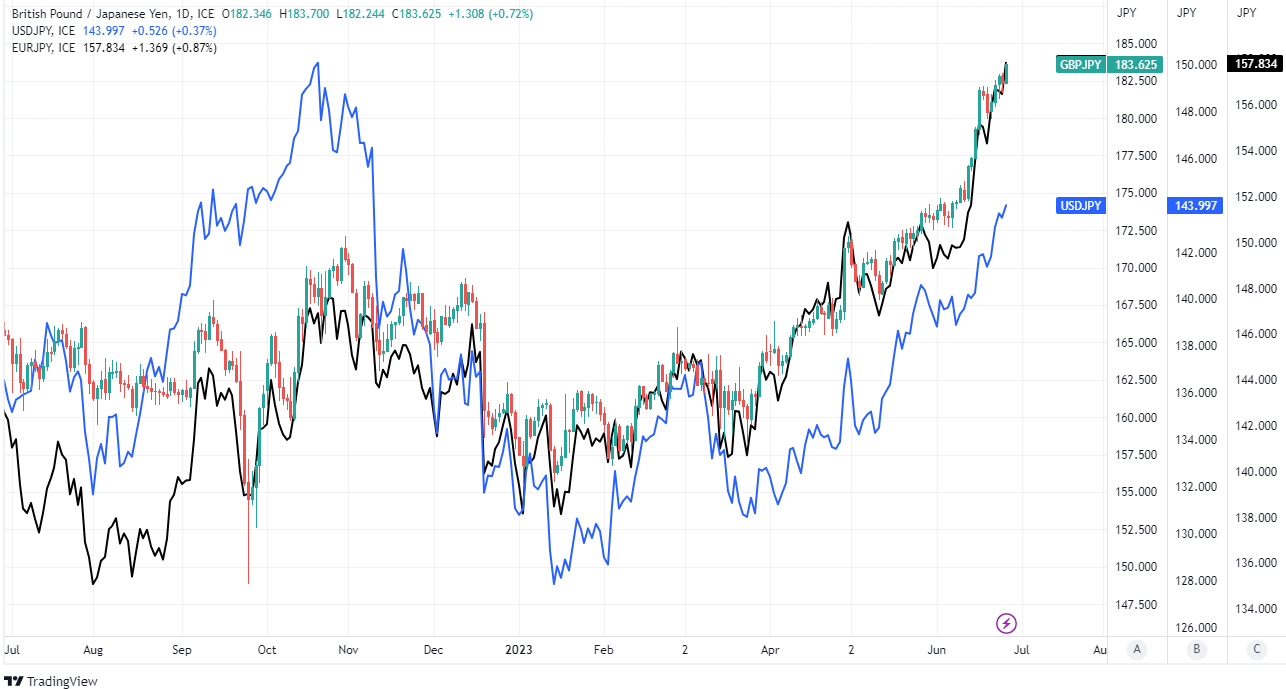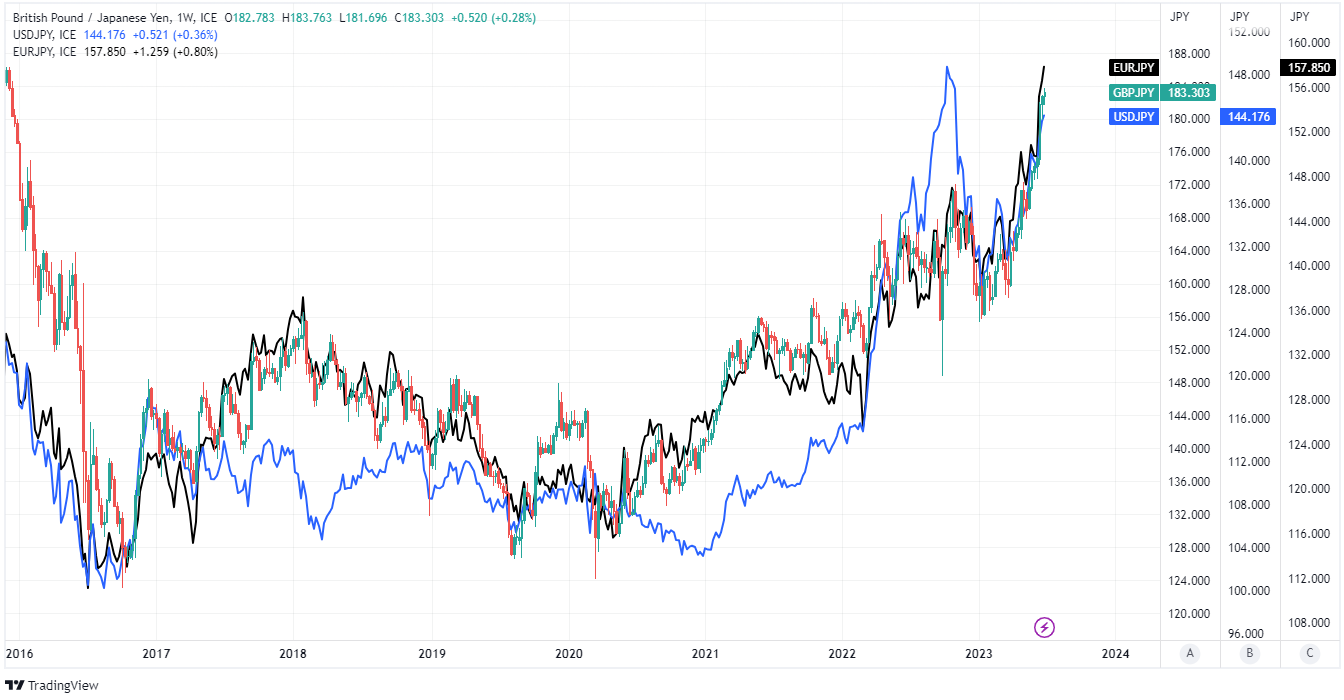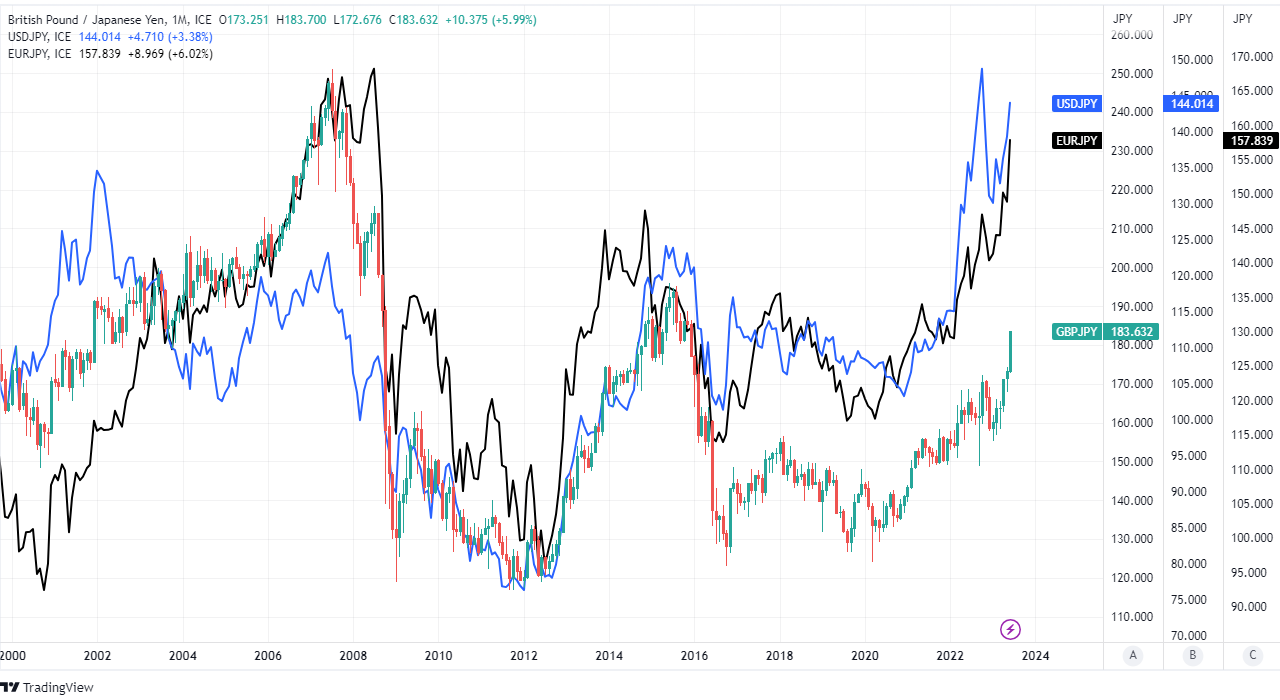Japanese Yen Risks Could Grow Further if Inflation Gets Away from BoJ
- Written by: James Skinner
"There is a possibility that Ueda will use Sintra as a stage to try and offer some verbal support to the yen, although the sustainability of that as a supporting narrative for the yen is up for debate" - ING.

Image © Adobe Stock
The Japanese Yen has reached milestone lows against some counterparts and prompted increased speculation about the risk of another intervention to stem the declines but any support for the currency might eventually be washed away if it later turns out that inflation has escaped from its lantern in Japan.
Further losses for the Yen had lifted GBP/JPY to pre-Brexit-referendum highs by Wednesday while buoying EUR/JPY to its strongest since prior to the 2008 financial crisis and leading USD/JPY to retest the 144 area where the pair was met by direct intervention from Tokyo back in September.
Meanwhile, verbal protests from the finance ministry have come thick and fast including with some echoing those prior to earlier interventions and much of the price action appearing to follow through on the latest from the Bank of Japan (BoJ) this month.
"The day ahead matters more than the day behind," says Bob Savage, head of markets strategy at BNY Mellon.
"How the BOJ Governor Ueda talks at the ECB conference and how the market expects the bond markets there to play out with YCC tweaks is critical to understanding where to put money in 2H 2023," he writes in a Tuesday market commentary.
Above: GBP/JPY shown at daily intervals alongside USD/JPY and EUR/JPY.
The Yen has lurched lower since mid-month when the BoJ expressed scepticism about the sustainability of inflation in Japan but losses snowballed late last week when inflation moderated by more than was expected and minutes of the June BoJ meeting confirmed the bank's continued commitment to monetary easing.
"Although there is a growing possibility of achieving 2 percent inflation in a sustainable and stable manner, the Bank should maintain the overall framework of monetary easing for the time being, since the cost of waiting for such achievement is not high," minutes of the June BoJ meeting say.
"That said, as for yield curve control -- a policy tool for monetary easing -- the cost is high," they add.
It's not clear what the BoJ meant when the minutes said policymakers discussed changing "the treatment" of their Yield Curve Control program in the near future due to the cost of enforcing a 0.5% cap on the 10-year government bond yield in the face of high and rising interest rates elsewhere in the world.
But what was clear was that Japanese inflation actually rose again in May once the recent moderation of food and energy prices is overlooked in last Friday's data and that the Yen might find itself in an even more vulnerable position than Pound Sterling if it later transpires that inflation has gotten ahead of the BoJ.
Above: GBP/JPY shown at weekly intervals alongside USD/JPY and EUR/JPY.
"As noted last week, it may well be the case that the BoJ is unable to fully extricate Japan from its dependency on ultra-easy monetary policy, and that this more than any other factor explains the BoJ's go-slow approach" writes Stephen Gallo, a global FX strategist at BMO Capital Markets, in Tuesday market commentary.
"This issue has been raised by a handful of customers. If it's true, then the BoJ is crossing its fingers and hoping that external factors move in favor of JPY," he adds.
Inflation elsewhere, including in the UK, has already proven much more difficult to contain than some central banks previously envisaged even with large and rapid increases in interest rates, leading to a situation where policymakers have come under pressure to go even further in order to bring it down.
This sort of outcome has already hampered the previously outperforming Pound over the last week but could be even more problematic for the Yen if repeated in Japan where the national debt burden is much higher at 2.6 times the economic output, which potentially limits how far the BoJ could then go to reign in inflation if it takes off.
"USD/JPY is facing fresh upward pressure this morning and today, hawkish comments by Powell, backed by the solid US data seen so far this week, could easily take the pair closer to 145.00," says Chris Turner. global head of markets and regional head of research for UK & CEE at ING.
Above: GBP/JPY shown at monthly intervals alongside USD/JPY and EUR/JPY.
"There is a possibility that Ueda will use Sintra as a stage to try and offer some verbal support to the yen, although the sustainability of that as a supporting narrative for the yen is up for debate. Any hawkish tilt in Ueda’s resolutely loose policy stance would surely have a more far-reaching impact on the currency
Many analysts are mindful that Tokyo could use foreign exchange reserves to fund intervention supporting the Yen while also looking to BoJ Governor Kazua Ueda for further clarity on the outlook for monetary policy in Japan when he participates on Wednesday in a panel discussion at an annual European Central Bank conference.
But while financial market disappointment might weigh further on the Yen in the latter half of the week if neither intervention nor any sign of a 'hawkish' policy shift is forthcoming, the bigger risk for the Japanese Yen might be of a fresh upturn in local inflation rates playing out over the coming months.
This sort of scenario would potentially be more bearish for the Yen if any renewed increase in core inflation is met by further inaction from the BoJ, perhaps because of continued concerns about the absence of a self-sustaining wage-price-inflation cycle, which the BoJ explicitly seeking to bring about.
"The Bank should continue with monetary easing and thereby carefully nurture the long-awaited buds of change in Japan's economy, including those in firms' wage- and price-setting behavior," minutes of June's BoJ meeting said last Friday.



